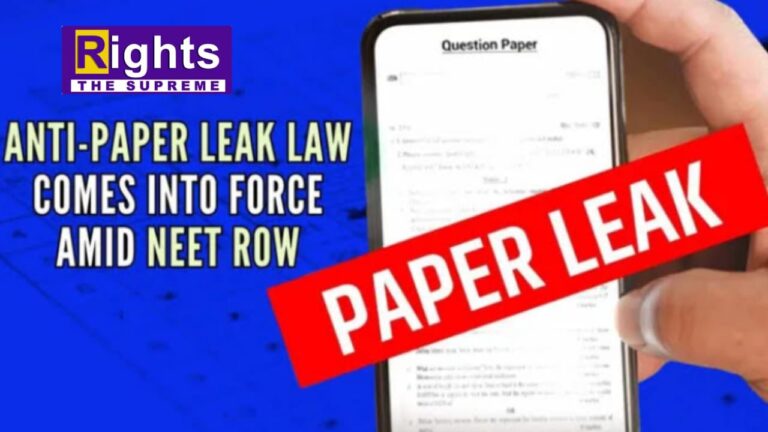The central government has notified a law to tackle unfair practices and questions paper leaks in public exams.
The law enacted named as Public examinations (Prevention of unfair means) Act,2024,has come into effect from 21st June(Friday).
This law come into existence to tackle the Malpractices,paper leaks, to secure justice in national level exams and to maintain the integrity of public examinations in india.
The law was passed earlier this year in the month of February. It was introduced in lok sabha on February 5 and on February 9, the rajya sabha passed the bill as well. President Droupadi Murmu gave her assent to the bill on 12 February, turning it into a law.
NEET Row:
It was notified on June 21,The central government, in the official gazette, addressed the nationwide controversy over malpractices alleged in the conduct of the National Eligibility cum Entrance Test (NEET) for undergraduate medical college admissions. The following week, after the aforementioned controversy, The University Grants Commission–National Eligibility Test (UGC–NET) exam was also canceled on June 19, a day after the exam, due to concerns over a paper leak.
KEY PROVISIONS OF ANTI-PAPER LEAK LAW:
Punitive Measures: The law prescribes a jail term of 3-5 years and a fine of up to Rs 10 lakh for individuals caught impersonating a candidate, engaging in paper solving, or failing to report exam fraud. More severe penalties are in place for those involved in organized cheating and malpractices, with 5-10 years of imprisonment and a minimum fine of Rs 1 crore.
Crackdown on Organized Crime: The law targets organized groups and institutions involved in paper leaks, paper solving, impersonation, and hacking of computer resources. These crimes often occur in collusion with insiders for monetary or wrongful gains.
Protection for Bona Fide Students: Importantly, the law exempts genuine students from liability in cases where their future is compromised due to undetected leaks, exam cancellations, or delayed results.
Institutional Accountability: Service providers and institutions found guilty of rigging public exams will be required to bear the proportionate cost of the examination, ensuring that they are held financially accountable for their actions.
INVESTIGATING AUTHORITY:
According to the act, alleged malpractice cases will be investigated by an officer not below the rank of the Deputy Superintendent of Police or Assistant Commissioner of Police.
It is also mentioned in the act that The Central government has the power to hand over the investigation of such malpractices to any Central Investigating Agency (CIA).

